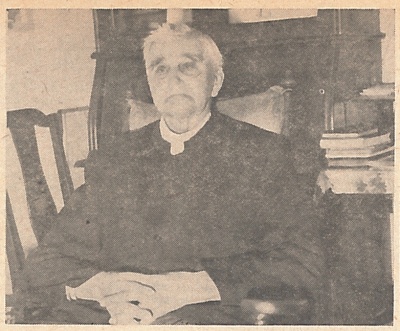If this site was useful to you, we'd be happy for a small donation. Be sure to enter "MLA donation" in the Comments box.
Bontrager, Eli A. (1861-1956)
Mennonite Weekly Review obituary: 1956 Feb 2 p. 3
Birth date: 1861 Dec 16
text of obituary:
Pioneer Minister Died At Age 94
SERVICES FOR ELI A. BONTRAGER OF FAIRVIEW, MICH. WIDELY ATTENDED
Fairview, Mich. — Friends from many parts of Michigan and from Indiana gathered here Sunday, Jan. 22, to attend funeral services for Eli A. Bontrager, 94, pioneer minister of the Fairview Mennonite Church. An estimated 600 persons were present.
Bro. Bontrager passed away at his home here Jan. 19 after several weeks of failing health.
Born in Lagrange County, Ind. on Dec. 16, 1861, he was ordained to the ministry at the North Main Street Mennonite Church, Nappanee, Ind. in 1900. Three years later the family moved to this community where he farmed and also preached to the small group of Mennonites. The church grew rapidly in the following years as new families moved in from other states.
Bro. Bontrager also traveled extensively in evangelistic work, and in 1915 took charge of the small congregation at Midland, Mich.
(A more complete story of Bro. Bontrager's life will appear in a future issue of the Review.)
Mennonite Weekly Review obituary: 1956 Feb 9 p. 7, 10
text of obituary:

Hard Work, Unusual Experiences Marked Life of Pioneer Minister
(EDITOR'S NOTE; The following life sketch of Eli A. Bontrager, pioneer minister of the (Old) Mennonite church in northern Michigan, was written by his son, Bishop Floyd F. Bontrager of Clare, Mich., drawing extensively on the father's own records and recollections of his life's experience. It was compiled during Bro. Bontrager's last illness, at which time he was cared for by his son and daughter-in-law. in his later years Bro. Bontrager was a faithful and enthusiastic Review correspondent.
Eli A. Bontrager, son of Amos and Lydia Miller Bontrager, was born in Newberry township, Lagrange county, Ind. on Dec. 16, 1861. He stayed at home with his parents until he was 21 years old.
When Eli was 14 years old his father bought a team of big oxen, black as crows. One was named Nig, the other Nigger. His brothers persuaded him to drive the oxen and they would drive the horse teams. Eli told them he is "just ox enough" to do that, so they got along allright.
His father bought a grain binder that was built to have two men standing where the grain was elevated to them to be bound. Eli could easily bind his share. They also had a threshing machine which was operated by horsepower using five two-horse teams. They never owned a tractor or engine of any kind on their 380 acre farm. All work was done by hand, horses or oxen.
When Eli was 20 years old his father gave him a very nice horse, buggy and harness. He gook good care of it and later bought another horse that matched the one he had. Driving two nice speedy horses hitched to a buggy drew the attention of the opposite sex, like the young men with their new cars today.
AT THE age of 21 his father told him that since he was of age, he could work for himself. He hired out to farmers. At one place he got a straw hat as wages for a summer's work. Another farmer hired him for $18 per month and put him to picking stones. He worked till his hand would bleed and his back was almost broken. One day at 4 o'clock he straightened up and as he looked over the field and saw the stones yet to be picked up and his bleeding hands, he took a long breath and quit right there.
He continued working for farmers until some time later when he sold his horses, harness and buggy. Having a desire to see California, he decided to go. He left home on Christmas day and after riding on the train for 10 days and nights he arrived at Los Angeles. there he worked in a store for one year and then returned to his home in Indiana.
ON MAY 3, 1885, he was married to Katie J. Johns, daughter of John and Kathryn Yoder Johns. They shared married life for over 50 years. They had 13 children. Two boys and two girls died in infancy.
In 1898, the family moved to Nappanee, Ind., and Eli worked in the furniture factory a while for $1.25 per day. His next job was raising onions. He signed a contract to care for 10 acres of onions. This was a new experience but with the sons he then had, they started. The rows were 80 rods long and 14 inches apart. This required being on their knees all day long pulling weeds but they did the job.
Eli was Sunday school superintendent for nearly seven years. On August 23, 1900, he was ordained a minister in the North Main Street Mennonite Church in Nappanee. Bro. D. J. Johns of Goshen, Ind., preached the ordination sermon and Bro. J. P. Schmucker of Topeka, Ind., performed the ordination.Bro. J. H. McGoun was the local pastor and Eli was ordained to help him They got along very nicely.